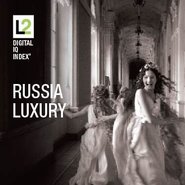The success of luxury brands in Russia strongly depends upon their digital presence, according to L2’s Russia Luxury Digital IQ Index.
A brand’s presence in Russia is greatly affected by their use of Russian online platforms like Yandex and VKontakte. Integrating a brand’s presence into a specific country requires a deep understanding of the country and sometimes a revamped marketing plan, but the end results can lead to increased revenue within that nation.
"The Russian social landscape might present some challenges for Western brands," said Elena Bohenick, L2 Inc. research associate and lead on the Russia Luxury study. "Despite Russians being some of the most active users of social networks, brand communities on both Facebook and Russian social platform VK are extremely small,"
Russia Luxury 2014 attempts to quantify the digital performance of 73 global brands and five local market leaders in Russia.
Russian ways
In Western countries Google and Facebook tend to dominate when it comes to online search engines and social media sites. However, in other locations, these two powerhouses are not always the leading contender for local users, so brands cannot rely on tactics from other countries when it comes to Russia.
Compared to the other BRIC countries, Russia sees the highest percent of Internet users accessing social media.
Yandex, a search engine site, holds 60 percent of Russia’s search engine market share and has a search volume that is 14 times the size that of Google.
Outside of consumer searches, brands are not running analytics on Yandex to gain more information about the Russian consumer. Sixty-two percent of brands have Google analytics on Russian sites, and 13 percent have Yandex Metrica.
VKontakte, similar to Yandex, outshines its Western competitor, Facebook. The social site sees 50.2 million unique monthly visitors compared to the 23.2 million on Facebook in Russia.
Twenty-eight percent of brands have a Russian Facebook page and 21 percent have a presence on VK. The majority of these brands are beauty brands and on average the VK community size is 2.3 times that of Facebook.

Social presence in Russia
One similarity between Russian and more familiar markets is YouTube. Sixty percent of Internet users within the country use YouTube.
Smartphone usage is predicted to grow in Russia, but much like brand’s social presence, brands are focusing on Apple’s iTunes where they should be looking toward Android. Seventy-four percent of smartphone sales in Russia in 2013 was from Android phones, but 43 percent of luxury brands offer an iTunes app and 35 support apps in Google Play.
From these apps that are present, 19 percent over native language support.
Internet retail has grown in Russia, but many of the local consumers prefer brick-and-mortar stores. However, it is increasingly difficult for the Russian consumer to use brands' Web sites to locate these stores. Eighty-seven percent provide access to a retail locator, but 63 percent translate that directory to Russian.
The top brands, according to the study, are Yves Rocher and L’Occitane. These two maintain visibility on local search engines and social sites and provide local adjustments to ecommerce and mobile sites.
Compared to the other BRIC countries, Russia sees the highest percent of Internet users accessing social media.
Assimilation
Emerging countries are a subject of interest for many luxury marketers, but reaching the right consumer in these nations requires a focus on cultural integration, according to the “High-net-worth-individuals in BRIC-dom: Facts and myths about their consumption of luxury” session at Luxury Interactive 2014 Oct. 15.
Brazil, Russia, India and China have a large market of high-net-worth-individuals who are typically interested in purchasing luxury goods, but reaching these markets requires time and attention. The session focused on the cultural approaches brands need to take to integrate themselves into the BRICs and reach consumers appropriately (see story).
Some brands have taken localized approaches to reach consumers from other nations.
For instance, Italian jeweler Bulgari used its London hotel and residence property to introduce its newly created account on popular Russian language social networking site VK.
As the second largest social networking site after Facebook, VK will likely drive interest in Bulgari Hotels. Although VK has three official languages, English, Russian and Ukrainian, the site also has over 70 unofficial languages that will only help to increase Bulgari Hotels’ exposure and possibly bookings (see story).
Integrating into local sites and trends seem to be a major obstacle for brands.
"Many global brands are struggling to adapt to the Russian digital landscape nuances such as the dominance of search engine Yandex and social giant Vkontakte," Ms. Bohenick said.
Final Take
Nancy Buckley, editorial assistant on Luxury Daily, New York
{"ct":"3dtgeOHqn9l+WOXAh\/tkAl\/FXA09hohsL1r9J3LssVi2maLxoO+yMWgbebFfEXaAWak4yzGF7N9Vw2ibjZSjos3VvgEL4bMil3pAgwrfOohy802\/zT8dPDjdAPCOjOSEOs77F6dcbpwyI7xvuPkNiTazLo2GyEBCGU4FZStqYJpBX5uWwET3JTAE7tYDj0r8Rv3hTaXrW0SxPJA7zCh7p0vYMyUsbGdxvnnZxmIE3uFudujc5HOuMjFd2CX8I0cvSwHlf+ocwoPDIiQE0WbnR3KYJxi7F+xXeymikcqsoV4PGIp3vERlYdsAeAj9xoN18VXX723VfbQrerWAkubmIt5di+dTq1UhIrcfeJH\/1Pa5LR5godnytE2iSNsKV69D0D0YVhw5uZYGsDrAUMXXoIdkRn\/px5MmupVr7H2b5j2ThLbZIYGox8rwyZektlCBwXgqJzuSRKFc6i46LTRdxYBigo367ecmLPEUclhujKW2iKtGqnd1JWf89FB3KYlw+vht5GV6PFnZpFhI7C9FaQqxnAiMbbs\/sXsKyzbEZIpI8yVWv23vqE0DKFpyN8stGjDP2ew3pSx9J472NZEhDCSCXvt88RgjhYW9hcyc3ofjO6mOd\/nXF4qhyItBYtWuRg4vwOoOoBCJXH8VOWEXNN1GRiaxgELZoNr\/IdHrjH4wx3k4ewHhQW46CXcJ0t3z9IYicG6zfBGQCyPD79\/883mTU7W5nkWnPaUVK9i+PH62mDkWywfMBC6btByNvzfLwEyHbGKeqvno9GJrrC8YH0iijrbhDjYsB0SwYWbxCLGNCc7nVXBeCOepx71dHveycdEUyvaHjOBPZPZQ1waMGEQAAJ\/O7kl2\/RSdXe+N\/My7EzTZR4hNEa0WZbFV+n5lCUDVcG5JYvJmBYdcAbHqIvYbTQ0oZYVA0c+1TT+NQZLe34\/a4UNecxHw\/CUhLfvJaHhwpK28yWa9o0iLBy8Pv6GtBMlvY9TlYK6CPuZ7AQnX9XXbzQU+QhpvhI8mo6N0p6twaAFi1a2gkQ9Epzn4ivk7Ptm0BMLQvJq7knZx4MM9\/B5bFLnq96TfduhFmn2Uw1ILfzc2niATtdfnYx8LwcQw4IRG36C5tSOUip1+2a6hT79Ia0kkPO8gYVfj1rzYqfUmQcIteiMX35hWIZJZ4ERcaYzeZ8yhGk8XATP8UoAmDDcSu30cS\/+gtSdGq6p2rMXsRtkS7lxbTtlOLoADLidNhSuO\/JgJ6BXBNSJDZoLccWEjb1BH+zYWZtBjFJdc8nQB3ezkYMyB2bNwDbnBctaBG47efZItZK7zXBx6xJ5GOr\/RRXOpnTKxXT4oc5jKS55yuKCup9EO3mqtBdHdrZR2pGPymY7QL7S7cNykf449KB4pVi6eOP79hLpKPYWqIYx2noa1ShIBCcQZBiW6uSEzeBtrN4n+rR8wMYjtHk1GCEEmOPnDjhS9bg7UhZEySGTkoevh8\/iw9SBGFEyR95Sg+dIJDTpSTsgvXF4zkWTx2IbPAhOrxQyY9BRFyjw1aGaT741wJS75v2PL62TAYAQAdEvo0aeSiQOMJkgH\/9tpjEdRIwy50p8eD6tlW0AF6iaQQf7WvlebiXz314cSabrrKLNagEo6naoBAjG\/bgE2m08yeKBHnjTAadS4XH+sDMcoppkxJWotvNNs0oYP8JNfy5BcMtWRUVi2gqPkD0mE75xARXx32dOES2PIj8KeVh85gUe4lAILNJqpLe\/7UX5mUfZ8xGhPjv+EhOY1aaLorWlrjbDPiI6kkGPEUjOlfNl+4iJx6jQshDHiOG6uxe3nh\/7gxzGkiE91c9RGX4s9Zq95sNSZAxlv\/C0qFiOwNp029HhfTDPzB1RgIT8kGzfbzi1Oxbm+2oknlzEGRK2MzuMtgtUrINQDmoBZJ0PE5SWqzkS880gDX6vYhSnpgfY6uXzLCCw29YYo5yyyuY57Sqy82Z\/ZMlCCBP63cwJ1Hktfy2gDr8Xlh8bv2baex5hO5GiKYgzDaFxbm76ZAFUaRuYLCE5\/L+jqCt2LBxa06BD4qezYOTQHw4KI04fsHEuUke7QLe0za2SK3Jg5rO+AZVmHPGVbYOGRK1liIcIIqgbEm3ada+kXyIyygKjQ6\/A0iKfmTw\/wbkOFoR8JSQo9bgBmTvhyIhIctB60t\/6xpyH1QrHyYGb\/aCGiHH5sk7a7sNSz3ciYwvVoN3OvTtijQOwa2gbEFb17FcfMBFng\/1djvUM0nD1nW8d1\/ewCef52\/dj8c+75kEsMIcEXvHfgAFeCk+uc02s5ZKu9bGB0WkOstsFZ7jdShHjxEAyq1tf9RKhOYE2dTZU2Ab0HU0lmWrI6jZJmAm0wKwrQp9HNgsU5S4I7DHUm4rVM5aKMmNg7iNgAxgxsOQN5m0hLyWtXRnQzUjOfiAVVuuNIiHsZIq0DAhAIDuX24KbesnpeJmEzGr+Fzdu8ZM3BbVUOkTvM8F2UXEYOgZFqr4S2xq0xaz8brHYJIYu8bsQ5hf6CK1HiOP08ORrYQhNh3czCqUYuBlVkxJZygXvmuoMRnnVzWV+0vNoAS+ys5+kLottlJylMO8w8+tt0gB8VysaNtxOyimCqzXv2efTO+3Jwhg3TWwbS4FXJYXPL3KhglxavihlHrY8zYcqlVISajbZUocrx9ONZM\/JtdhsGF7E3hzZNpQXZxSAbf2gYuHmXY8eWr4zUntgXU2q3EBcVoiQamnIPi9XPXZmwnP++\/Tqs5CAz6XTZbakEec0xv0dmaxeIh57ARzWws+pDbG7n4u9BIU0ht4rwi\/FJke5I\/sDxUvjTJtW2sH3OEMf00+qQtziMd60w0WLPAcVtRu0yMbMg7WSNl8eH+TH0\/E0AENdbygps67pANjtb\/Kd+Y6o+NnAKKflZ5W+tEwg9eqBkfXBlnaxC\/wsE7tgbLAAnUHFcgGSmSMn5a3ihU8vm+B8opbAvF94D4\/MDHDCQEhlCtR+sW29MoJ1bRkc0iEg\/fwStcUFVoKIz6vlexK96b9lVrddfg0QXYGdYMOptNWXUGcQNiRUB9esULQrDxkvDyKXuHHQM+N+J0x\/JoZI8CPULkMqeZgD1JQAhAnQuua3v0ULfk0mjMm9EubK+xkkd38A2AHKkaDCpZf+O6OnqLkG4RtNs\/jAgFriBIoZEXy3j6kGbtW0Td5J7ph6Tj23H8nkKDd8pqTXxgPmt6Lfm26KDTPoo7LOtViQ6oQpUNbqzkzif\/HpamyT88YZ0iH06CxPYwL5noCQon7RmqPH3mtL+SnrTKVZhZBLZB9iq3qpP4LOU2M1hWWHo+7+3\/3Emgo6v4XNV6i51+\/WAv0U2PcdYiuIdRpLL6WbZK5+UENJuaVB9XHuRp3s4lVNF90HBege73o1\/h\/2klcx8hm9Y8rCoSxeKVmVcumujXLQbXyeUCY\/4NAskyewM9UfrYrknD86E8aWVmu2\/W17cU\/yfFBXGGTAeX1d3oQuzasekSXqjypCLmK66gYHUxt8bC62h36rDIly\/fMoFWXHWquGY\/hguWIw4bsPRU9En7jjtb7sBuMlNQs1b++jvYHPgA+oSDJN4hD27QTIURuM55\/VylHwa8Bkath9Ej\/LcnEKAVVdt0sGDSc7UGPvFVwnFafOGAD5AJxykZ+oj\/Ypuuh+idO5icRgxlpCeb9G\/h23kY2RzsMHnSocHhayzhinpSobE7610Me66JCmW81XrlT8M5UwIgXXw4ByaLZ8clHC0Ed7PKhQikgEsN1StqRkpSI9WoZTJpkb4tHXMsxAApJj4E\/YsP0uHbwbPmIc4CF+c9hIkhIT0YhfEmJ0RNNWxTwrFhYxJLZtQvubvK72Pw8yIcy67KfDN7hhjI0oYfUHOgCCRw8fgnMNb60Pidq23SxdVsjqPzEecE3oYyZhvt9RyD4k8CtH0KYsNnaKogZXH1k2FnhsunOPRSAMhYgJ20sviRR8\/6QqDM1p779W5xvfaR1sM8\/FMmkn07H+9a44gTJt5r\/OzbBDEM0XJn2YvtgUlWFNSL+LcYn0EH3N4FY+pwIKpqOsblHZf2jvdU3KkZP2o9\/ZCTrWjtRaobU9sAk8PvDJfQ96sGdWC6QzT2UWzDJnLldbraTOORr3c0K4dzGu55iqwvPG0e8z6tnwZLWNvh0UQuI6gVE0pstDa68idEXU6JDxIEaflz6QjTJQW2klV+d0ff05gLJ4zc3OLBnadqVwjswGQBU5FMo8AQDGAIHmoiU5AOn4K2pXJZCVE5NIRmU5VdpCzYPfxF7uSK0kXfbVMgOsmEEtou24P3YJ7\/o3IyZK7ijd3l+0fqsxA53tUgQCGnJtBx6hKGyoQPxEX2qGI1YAcYHZ+Qr83Ij70dxB\/LHOGDvQDks1CKwfIB8yV\/FhKY7bVz7pN2A9PhGjCDg3Pp8j\/MjpR2+\/cwZf3fOXxX5pKofqWUCItT3VHNhuwnS+hhxPjfmE0BKcWA8oXXysJpG5gRhjTHAhOx0p8kS5qMZANNDQosRcr3gznuq8dKZMEPU8bKzYlZH+joO0jGqhGwvd+Vh7NDo1ULYONt\/pgjAv9XK9SkPiO47qyeW2Ocy6cIa9f0ct\/DfR83Oe0IYGwjuPefuqMLguikyw6OjAtgnD5hYgyzDQGMN04VZj15Fi\/NvFWAhFrG1XnQypC7ymxOvkASMovSNZxOnaUvBoMQBAC6hS5Bme2S9lcgMGimI09vNApsvJR8PoJX2I3inD4v9tJjj5vGsyyZTZZq3C7lBiuGTOl7rUsycAv\/XQ87hwvMuEswDJ3QL49zsevjwuWvpgLCj0LIdmeZxzmix3tWW9aRMQ0lICcFZQ55x\/pJGYB6lUop0i39L9vjURYCN+gZfMVXLviY9gUtNpFc9Sf\/P1Hy88Acz2b02Ekmq3fqXGm+GzeEUum8SzeBnEzvv6GESC2Dji3GqWAzZLght00p8Quxg6\/PfDoRHnr1zNWoYSN\/fxqaIxNUtSjhUzEQr9EtdrSsP2gC8UUVfstH8W7d7AlaazNug0OlFwXlQsE+brE4+nRtGF2mY8Ywu4W42HjT3++z1SvS5ZdjszgOcEjAbkM+wvS6113sBtiOTykwp8Uxw00ug+yz2vtXtL2fKapdEGzW6Y5\/xzv9DzDF3GhzoDagcr8nBX+DpgyLmTi70mOw2IHaSMXTQLKPkmVmPy+HzVqwGFemvLJ6Hrw0vcDFI3j8L32xBth6nOlns+ptGlx1rxEDPD0UCDqENwAqOQHtYMPh3VOtjyibixQzOjuLm3HjyaLOARhMr5UU1IwomU8giJ8TviZNc+t+gC72hoZb6QlN6bTaYM5uJOO5ogZiWJmtSPSA3WaZ+MuFNT2lqAQEOxDgleE7\/fgDBRWktlQrDWasXjhg7XJ3hIYK+MNM3jgdR9HrAhH\/MYl6lqYIWViNBfzMNg3+oMo9Wt0tFx8nfAdE7\/p0gbbPj6x3jAjVj70AUdNpS3aUA5sS3AIpu1Hl6939SLwPQBWNlPQR7KIiuLR0ze9QHjovqeXJ5Y9HhZKPPwzEF494RvKNZxlII4rug9jLs+jUk0wUVstBt7Tah1tYiyrq+RaJK2S2ri2QYyGqfMPdLERNLbpF0QrCSld3NLPVLrY3v0\/4OsfGWafZU1NfdXkhVS6ovYphdeCDnNIbz1Q1oUHNoBUNHCrNczUqFCTXWO49Xd+MviONuGoi7L0nCc+Qu7b8CsdX9BTEYXraOIk1FZIKIY9wpw0j0M9vEd\/dyXHCl9MMm\/cED\/Gqn0alTHCw74FKCb08EGf3pMJJkFLnblRrDg7Q5fzs14UC5EvitSApweEL5W4z7+xdIs\/Rr7ObAGBdjsUc4QPihXIokFzK0ztMp1V3xdKNmRRmjz5uEbrcg5X\/OAcfqPG1g7AZg5Fu34i25dMJNdFkrVd2GrikP0tYK+GnPlxsWuE0\/61cpbCBb2OnVHgz3umfufbFeyFQ3C7hfaHom9HaXD0iV\/4RLewLUGDmy9AD6AYdFqomrYmaajdtRtK336cHWAmhwjOA+a8c\/hHtz2YEHQRuxvXBFrKi1Gh2hUOBqVDZFJNb6YWNUU+proi+qc2cV3PUfnDRn6i+9k6jK4LNyv25Ki0JS63e42Na4KhAuRI7ckgggEyMyS8lGFGUvjuwIHDxiOo46gWPnkCSGCPlvPdNaYda4\/XIQX2mQcPq+jmbjSbjEoOZ3WyGKZJOmpcs6mhlrAXmMqpGwJLlT2G5Qqw4tvB+FU\/25ns5tRQ1WhXHefemRuVQGAto5rO+qbJRuoke\/8K6ZGn4fHXMIXIdfu70Grj+6a3d0xPX2jrx1Ie5QC\/\/NhMbtko8t5xHo\/Vstfk\/+qGy6syRZ1FWLH4XYRMJ6I7BSG0hepp86mcfIlieJjAOIPWGv08\/+idQoBH324ZZLcuYapFyFyuS8zj34dICJ+iUgXoarH+DdOWTJKu7zJVPjTHeLHZ+OnqgCF3T3mn0Cl4Py5TfiPPihkCvZPhK5eo4s0EzhAn+pu9be9E7DE1teCUsKAQ+fdn9WUq0cmsonUub+sDVN1k2oBf6\/+GRV2VgNwNCAxH6\/STDkzDyMIOz7\/rULXXmcIxexazhK6KA\/zwuUur\/Da7GC6D5QQMbYepMSa01p6aNkfpFTh5rk1lTKfccMFT843NJCtiJcpHv4uSd8zk+s7OTnfD4AH1eztix9wTKub5ev62sDYdYDa\/3nFslZSr44yN9EJq1z2VVhPJUqcPqXRky+TKs1cAv2DZEPUroi0U6XnpGYzFUf6nodlBNioER5w1G+GOvMI8uZBCj5RsmUI8y3CRwRugGTrvbYgzfcauuI7YAHBXxBv0c9kiJ3tMPKV2+lFXw7w0Ym2usmX3RHQKwZMlN4cvpPRUWTzbCJRW01BTDvlKkPMgJXpjmsEI9DbdI5wMDTQcgMNB2Fc5VloZkS+e34H0kmx9ao\/E08csOmA92WfplXgaA38YfiN0S4x6pcEKG\/9E+Lb0dvlYwwqdEF8ABmb8th9Qdul8xCNRcnMNsQLn5ARZmLnKpU4AjPSpkRP3Xe27OLa5J3tFjah7XJoqIJkKcBJ7jjH4PBh8HnVT5+tMF\/F8EYOJKGB7o5TbVQfcv2qKz9F71kiikXjtyKhZUpEp4KGrbDpH21SP9fOhKsha9+\/vxacT69Q4ICpha1+CDh6FmMACQwialnsKU0pNZyOy\/n5pODTYJSMi5ykVI2PH1HWbrbQBJxT5fgD1zruW31f5iOtr0kR\/799YK84jjTRpz8GJma0QtuMxplZ8AHk4kKUpXH+yEWeJnZkT5nTRFcZsUjt1OwS838+5YYEiOrcp\/9zZteyO9vu2bHf7ptGbGBU2a\/\/YKgv5yY4UyFWyh5WzscM1weslUk7unSTHtoWplnfNkQgxb\/6ieDgYgSq+6YQSewSXuPwEX4abh2a6\/I1vjs\/fnDswijGijTMT6LC+plGDoq2CZL4nWHuTqqY1JyYiIqVmZXJaFvzhyP0mWKdudJa6E\/S9JSsxjov9xvz7OKicXpzWU0PcqCHTfdzsbJme9eUnNg5e+\/XiCF58s99AUe2mRcqsoHzYHWGr8wHJy18tkOdUs7B53gSPBYz2Pzyyuwqj8s06USxeoJ4xhJardw2zoZnbg3MDpqFbaBmDD\/KVZvZYSCU\/59fbzRcQlWV89hwXBlysCIg38B5Bko2DRYIR8Zd66DGm2Dj9oSrVDTlsj1nyqoLb9PvPsEAn39pdCoVGjjgNK01RLTSUVOAvQJDd36RtsygCgOjuMo75oY3BDNtEyJIg\/4TDw1AW0M6VJySAkhxZ8KbaK\/NNo78\/gTOhrsIvcZJxFXIClaGWTpAYiBVN1p26tqehZnCCBTJI1gL77lCxooQzPBIx0cedFw88bgA0rdZaAGc3497M9thO2D3AxvTprmVdSWa+WZnaDOM+SSJGh6VYNQIgulp6YtXi80YY2oWtut3S+gAe4DZmBhTbmf0hPik+rpYGMp5QrumzPveg3qKAucX\/or0K+E\/lV0P\/WHeY\/cSzP2pT84ouZYCmZsFawBRosQwTYR0nogZjbcxrlldjuqV0hba\/tm6lOrnI20ndRvcFfCZICRydeaME0X1+y9XXLsAMRxGhKiklTbrErt\/kCYSY\/GwUlkVfAaO2x1nLIKp3xz2TCRxd9INocGnGBi4wJUiWMUI1XqgjiLqCckgxCA7ePqIaPDg77\/STbns9rN5rSJeAtCg7zYCpXkSMrRo4qD6o4mmznR88lqYAikKyrNYolaZNfszmUMR2oIBlsXfBRVpNve9eGxbNRGC3R5NJTwZ\/+Fw=","iv":"6164fed747d5e1efccb69dbf0f8d3e61","s":"c613f389baca0406"}
